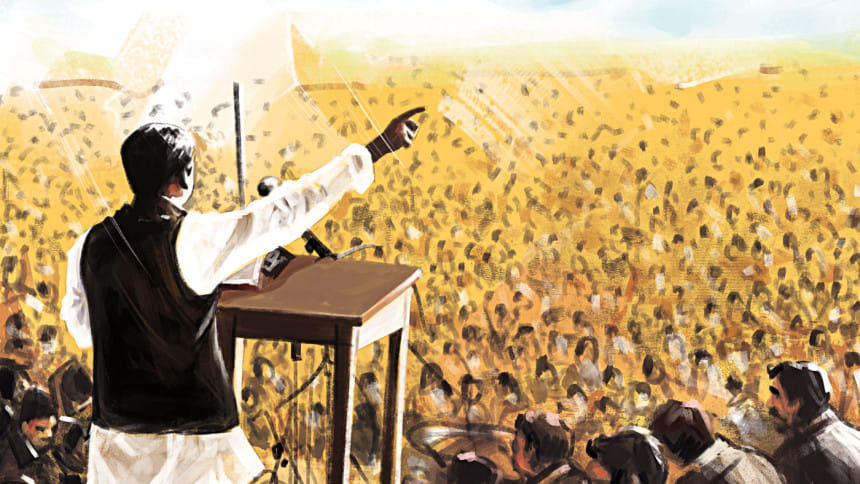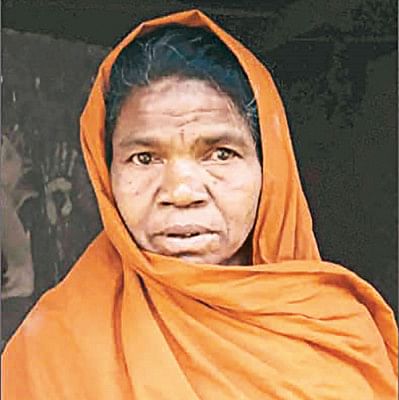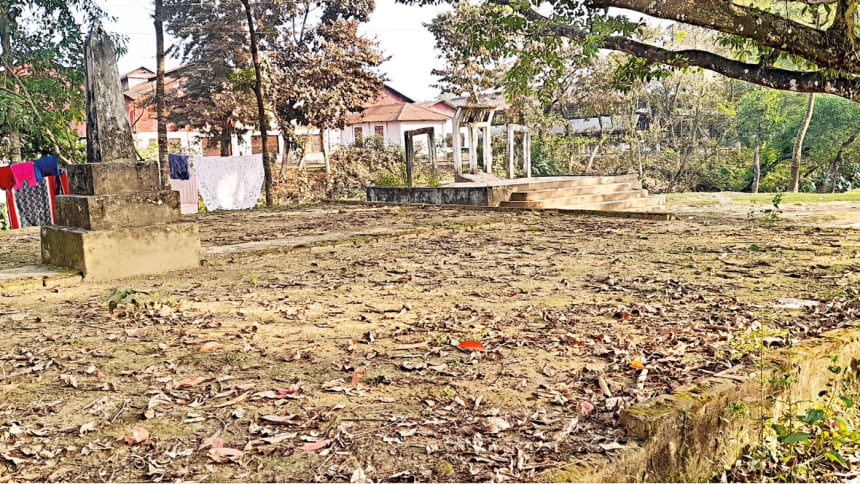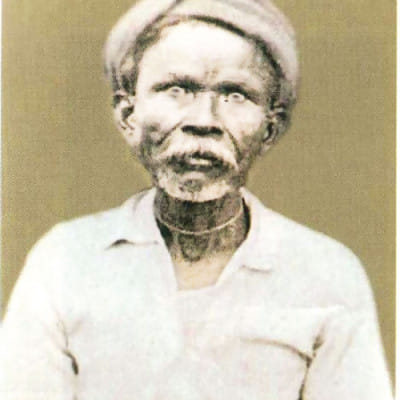Red stains in green gardens

When a column of Pakistan army vehicles entered Dewrachhara Tea Garden in Moulvibazar in the afternoon of May 3, 1971, most of the workers there were alarmed but had little strength left to do anything about it.
The non-Bangalee manager of the tea estate had fled to Pakistan before March 25, leaving the workers to fend for themselves.
Most of the impoverished workers and their families lived solely on rations and their weekly pay.
Their rations ran out in early March and it was never replenished. They got no pay since the manager left. They had been trying to live off the land, unfed or half-fed most days.

That day the Pakistan army, with the help of Razakars, gathered them at gunpoint and loaded them into the trucks, promising rations.
But the trucks stopped just 10 minutes later at the bungalow of the estate. The workers were offloaded, tied up and made to stand in a line.
The Pakistan army men then opened fire and mowed them down. Those still alive were finished off with bayonets.
That day, 54 workers were killed in the genocidal act. Only 12 survived with critical injuries.
Anukul Ganju, who survived the massacre by hiding himself and later joined Mukti Bahini, shared the story with The Daily Star recently.
The Dewrachhara is not the only tea estate where massacres took place in 1971
As per the research-based book "Cha Bagane Gonohotya 1971" (1971 Massacres at Teagardens) by Apurba Sharma, 545 people were killed in 66 tea estates of Sylhet, Moulvibazar and Habiganj during the war. Most of them were workers, but there were a few staffers and owners as well.
In a book titled "Muktijuddhe Bangladesher Cha Shramik", researcher-writer Dipankar Mohanto listed 588 teagarden martyrs in Sylhet region and Chattogram.
The Pakistan army's wrath towards the workers was brutal as the workers were mostly non-Muslim and supporters of the Awami League, Apurba stated in his book.
The military also considered the estates as suitable tactical locations, and officers who decided such things liked the amenities available at the usually lavish bungalows.

They went in, killed people, including Bangalee staffers and owners, and took over the estates, according to the book.
On April 18, they killed 41 people in Tarapur Teagarden in Sylhet. Five members of the family that owned the estate were among those killed.
The next day, 44 people were killed in Khadim Tea Garden in Sylhet.
The Pakistan army men even burnt people alive by locking them into houses and torching them.
Apurba in his book stated that April and May of 1971 were the deadliest months for people in tea estates. At least 455 people were killed in those two months.
THE RESISTANCE
Tea estate workers were intensely involved in the Liberation War.
During the first days of the war, they tried to stop the Pakistan army's entry into Sylhet by blocking highways in Habiganj and Moulvibazar.
They also tried to revolt against the Pakistan army's occupation of tea estates.
Many estate owners, managers and staffers actively helped freedom fighters.
So far, 296 tea estate workers have been recognised as freedom fighters by the government, Diapankar mentions in his book, adding that another 145 who fought for the country never got official recognition.

The book also sheds light on the difficulties in unearthing the sacrifices made by the Biranganas in tea estates.
"Such brutal torture and the stories of Biranganas are unknown to many, as most victims hide it out of shame."
However, his book narrates the sacrifices of 25 Biranganas, including Salgi Kharia, Laksmi Sabar and Murtia Rabidas.
Of many Biranganas, only Hiramoni Santal and Sabitri Nayek of Chanpur Tea Garden in Habiganj, were recognised as freedom fighters on December 9, 2013.
Hiramoni passed away in March 2016.
Sadly, the contributions of the tea estate workers in the war effort and valour of freedom fighters like Anukul Ganju go largely under-appreciated.
"Since the British era, tea estate workers have been deprived of honour. Despite their valiant resistance and sacrifice, they have not been recognised," said Apurba.
There are plaques and memorials at almost every tea estate that experienced the massacres, but most of them are in a shambles. Moreover, no national-level initiative has been taken to recognise these sacrifices in the last 50 years.
Contacted, Major General Md Ashraful Islam, chairman of Bangladesh Tea Board, said, "We are planning to establish a museum on Bangabandhu. The sacrifice of the tea estate people during the Liberation War will also be documented in the museum."


 For all latest news, follow The Daily Star's Google News channel.
For all latest news, follow The Daily Star's Google News channel. 



Comments